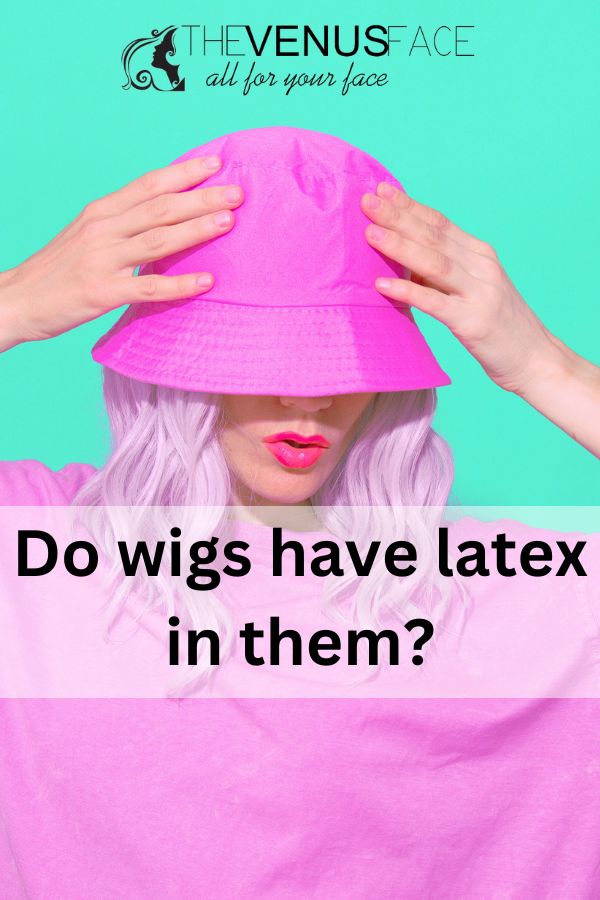Wig caps are fundamental accessories for wig enthusiasts, offering a foundation that ensures a secure, comfortable, and seamless fit for wigs. However, a pertinent question arises regarding the materials used in these essential items: the presence of latex. In this discussion, we will explore the question of whether wig caps contain latex, examining its implications for individuals with latex allergies and those in search of hypoallergenic alternatives. Understanding the composition of wig caps is not only crucial for comfort but also for the well-being of wig wearers, making it a topic of significant importance.

Do wigs have latex in them?
Wig caps can be made from a variety of materials, and whether or not they contain latex depends on the specific brand and type of wig cap you purchase. Some wig caps are made from latex, while others are latex-free. If you have a latex allergy or sensitivity, it’s important to check the product label or description to ensure that the wig cap you choose is latex-free.
If you’re uncertain about whether a particular wig cap contains latex, it’s a good idea to contact the manufacturer or retailer for information on the materials used in the product. This can help you make an informed decision and select a wig cap that is safe for your skin and comfortable to wear.
More: Can you use a wig cap for waves?
Best latex-free wig caps
What are wig caps made of?
Wig caps are typically made from various materials, and the choice of materials can vary depending on the manufacturer and the type of wig cap. Common materials used in the construction of wig caps include:
Nylon: Nylon wig caps are lightweight, breathable, and stretchy. They are comfortable to wear and are suitable for most wig styles. Nylon wig caps are a popular choice.
Spandex: Spandex or lycra wig caps are also stretchy and comfortable. They provide a snug fit and are often used to keep hair in place and create a smooth foundation for wig placement.
Polyester: Some wig caps are made from polyester, which is durable and provides a secure fit. Polyester caps can be a good option for those who need extra support for their wigs.
Mesh: Mesh wig caps are made from a breathable, net-like material. They allow air to circulate and can be cooler to wear in hot weather.
Cotton: Some wig caps may contain cotton, which is comfortable against the skin. Cotton wig caps are soft and breathable, but they may not have as much stretch as nylon or spandex.
Latex: While less common, some wig caps are made from latex. These are typically avoided by people with latex allergies.
Silicone: Silicone wig caps may be used for special purposes, such as creating a non-slip base for attaching wigs or hairpieces.
Can you be allergic to wig caps?
Yes, it is possible to be allergic to wig caps, especially if you have sensitivities or allergies to the materials used in the construction of the wig cap. Common materials used in wig caps include nylon, spandex, polyester, and latex. If you have a latex allergy, it’s important to ensure that the wig cap you choose is latex-free to avoid an allergic reaction.
Allergic reactions to wig caps may manifest as skin irritation, redness, itching, hives, or contact dermatitis. It’s essential to pay attention to any adverse skin reactions when wearing a wig cap, and if you suspect you are allergic to the cap, discontinue use and consult with a healthcare professional.
To reduce the risk of allergic reactions, you can consider choosing wig caps made from hypoallergenic materials or those specifically labeled as latex-free. Additionally, washing the wig cap before use and using a mild, hypoallergenic detergent can help remove any potential irritants. Always follow the care instructions provided with the wig cap to maintain its cleanliness and integrity. If you have known allergies or sensitivities, consult with your healthcare provider for guidance on selecting suitable wig cap materials.
Pros and cons of latex-free wig caps
Pros of Latex-Free Wig Caps
Hypoallergenic: Latex-free wig caps are ideal for individuals with latex allergies or sensitivities. They eliminate the risk of skin irritation or allergic reactions, making them a safer choice.
Comfort: Latex-free materials, such as nylon, mesh, or cotton, are often softer and more comfortable to wear, providing a smooth and itch-free experience.
Breathability: Latex-free caps are typically more breathable, preventing excess sweat and discomfort during extended wear. This is particularly advantageous in warm climates.
Versatility: Latex-free wig caps come in various materials, colors, and styles, allowing you to choose one that best suits your needs and preferences.
Odorless: Latex-free materials do not emit a distinct latex odor, which can be off-putting to some individuals.
Durability: Many latex-free wig caps are durable and long-lasting, ensuring that your wig stays securely in place.
Cons of Latex-Free Wig Caps
Cost: Latex-free wig caps can be more expensive than their latex counterparts. However, the added comfort and safety may be worth the investment for those with allergies.
Limited Elasticity: Some latex-free materials may have slightly less elasticity, making it a bit more challenging to achieve a snug fit. However, this can be mitigated by choosing the right size and style.
Variability in Quality: The quality of latex-free wig caps can vary between brands and materials. It’s essential to choose a reputable brand for a reliable product.
Lack of Grip: Latex-free caps might not provide the same level of grip as latex ones. This may require extra care when securing your wig to prevent slipping.
Availability: In some cases, latex-free wig caps might be less widely available than latex versions. However, the growing awareness of latex allergies has led to increased availability.
Does wig glue have latex?
Wig glue can come in various formulations, and some wig glues may contain latex, while others are latex-free. It’s crucial to check the product label and ingredient list of specific wig glue to determine whether it contains latex. If you have a latex allergy or sensitivity, it’s recommended to choose a wig glue that explicitly states it is latex-free to avoid potential allergic reactions or skin irritations. Always read the product information to ensure it suits your specific needs.
More: Are Wig Caps Reusable?





